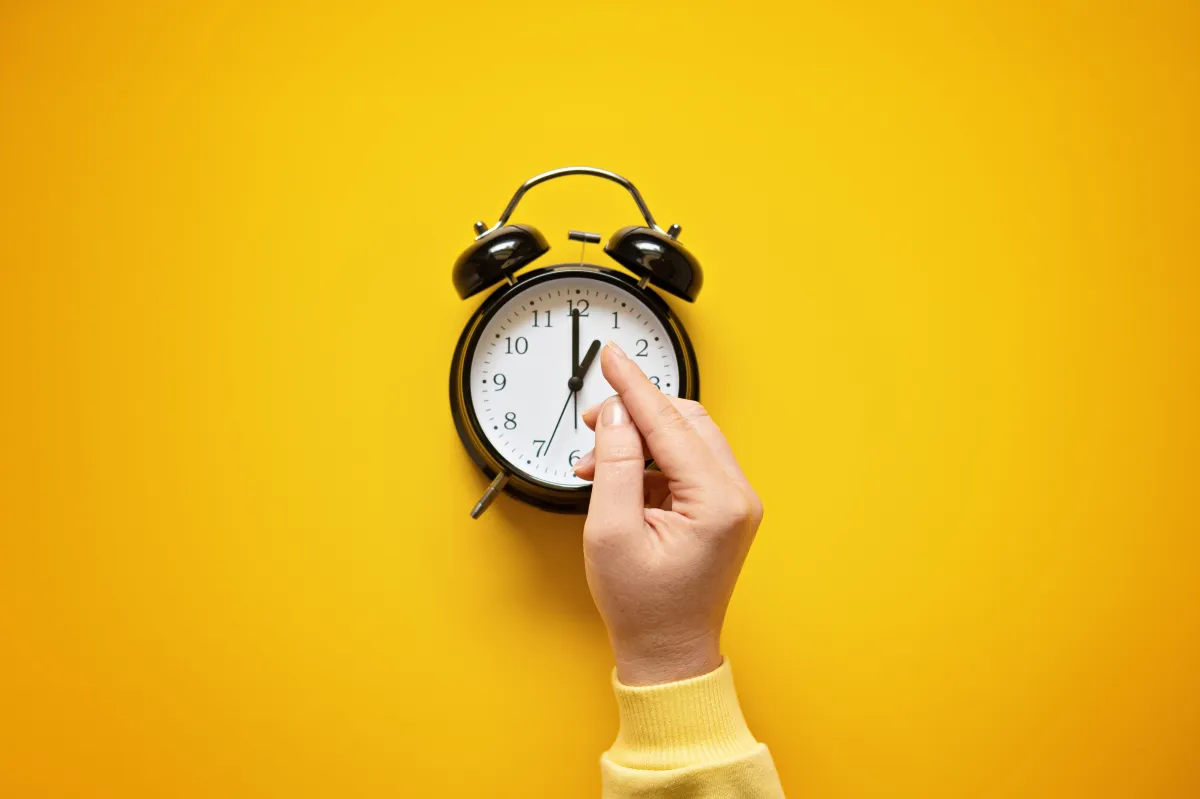Blog
Inspiration In Every Post

How Day Light Savings Impacts Sleep Rhythms & Physical Health (Part 5)
“As the year turns and the seasons change,
We make a move to rearrange,
Our clocks and schedules,
Time to shift,
To make the most of daylight's gift.”
Gift!?! For many, just the thought of losing an hour of sleep due to Day Light Savings creates anxiety. What comes to your mind when you think “spring ahead”? The gift of light or being robbed of sleep?

Are you ready to ease into the Time Change?
"Day Light Savings" and "Spring Ahead" are terms used to describe the time change associated with Daylight Saving Time (DST) in the spring. During the spring DST, we move our clocks forward by one hour, meaning we lose one hour of sleep and gain an extra hour of daylight in the evenings.
The term "spring ahead" refers to the fact that we are moving our clocks forward, which makes it feel like we are jumping ahead in time. Opinions about the time change of "spring ahead" can vary. Some people may enjoy how it brings extra daylight in the evenings, looking forward to the change. Others may find it difficult to adjust to the time change, particularly if they already struggle with sleep issues or have a rigid sleep schedule.
Do you have kids in the house? The affect of Daylight Savings Time on your sleep can cause increased irritability, fussiness, increased anxiety, and difficulty concentrating can translate to drama-filled nights, morning meltdowns, and poor grades. Parents may feel the pain from their children, toddlers to teenagers.
Daylight Saving Time (DST) can have a negative impact on our sleep and mental wellness in several ways. Here are some of the reasons why:
1. Disrupting Our Sleep-Wake Cycle
The time change associated with DST can disrupt our body's natural sleep-wake cycle, also known as our circadian rhythm. This can cause difficulty falling asleep or staying asleep, leading to sleep deprivation and fatigue.
2. Causing A Loss Of Sleep
The springtime change, when we move our clocks forward by one hour, can lead to a loss of one hour of sleep, which can have a cumulative effect on our health and well-being. This can cause feelings of fatigue, irritability, and difficulty concentrating.
3. Increasing The Risk Of Accidents
Sleep deprivation and fatigue can increase the risk of accidents, particularly during the first few days after the time change. Studies have shown that traffic accidents, workplace injuries, and other accidents increase in the days following the springtime change.
4. Affecting Our Mood And Mental Health
Disruption of our sleep-wake cycle can also affect our mood and mental health. Lack of sleep can cause irritability, anxiety, and depression, and may exacerbate symptoms in people with existing mental health conditions.
5. Disrupting Our Daily Routines

The time change associated with DST can disrupt our daily routine and schedule, which can cause stress and anxiety. This can be particularly challenging for children, elderly adults, and people with certain medical conditions.
Impacts On Physical Health Correlated With Daylight Savings Time
There have been several studies conducted on the potential link between Daylight Saving Time (DST) and heart issues. Here are some of the research and statistics on this topic:
1. Increased Risk Of Health Attack
A study published in the New England Journal of Medicine in 2008 found that the risk of heart attack increased by 5% during the first three weekdays following the springtime change (when we move our clocks forward by one hour). This increase was attributed to the disruption of the body's natural circadian rhythm. You can use a free service like Google Analytics to track how many people are visiting your site. This will give you an idea of what kind of traffic is coming in from where. You can then decide whether or not it makes sense to invest money into advertising.
2. Increased Risk Of Stroke
Another study published in the journal Sleep Medicine in 2016 found that the risk of stroke increased by 8% during the first two days following the springtime change. The study also found a slight increase in the risk of stroke during the fall time change (when we move our clocks back by one hour).
3. Disruption To Sleep Patterns
DST can disrupt our sleep patterns, leading to sleep deprivation and fatigue, known risk factors for heart disease and stroke.
4. Impact Blood Pressure
A study published in the Journal of Hypertension in 2015 found that the springtime change was associated with a small increase in blood pressure, which can increase the risk of heart disease.
5. Increased Hospital Admissions
A study published in the American Journal of Cardiology in 2014 found that hospital admissions for heart attacks increased by 24% on the Monday following the springtime change. The study also found a slight increase in hospital admissions for heart attacks during the fall time change.
Overall, while the research on the link between DST and heart issues is not conclusive, these studies suggest that there may be a potential association between the two. It's important to prioritize good sleep habits and take steps to minimize the impact of the time change on our health and well-being.
Many in the US had hoped for its abolishment in 2023, for now it will likely stay in place. Whether or not Daylight-Saving Time (DST) will ever stop is uncertain and depends on a variety of factors, including political, economic, and cultural considerations. Some countries and regions have abolished DST, while others continue using it.
Preparing for Daylight Saving Time (DST) can help minimize the impact of the time change on our sleep and daily routines.
Here Are Some Ways That You Can Prepare:
Gradually adjust your sleep schedule: Start adjusting your sleep schedule gradually, by going to bed and waking up 15 minutes earlier each day, beginning about a week before the time change. This will help your body adjust to the time change more smoothly. Add the blog element to your page and select if you want compact or list view
Limit caffeine and alcohol intake: Caffeine and alcohol can disrupt your sleep patterns and make it harder to adjust to the time change. Limit your intake of these substances in the weeks leading up to DST.
Get plenty of sunlight: Exposure to natural sunlight can help regulate your body's natural sleep-wake cycle. Try to get outside and soak up some sunshine each day, especially in the morning.
Adjust your mealtimes: Gradually shift your meal times to match the new time schedule. For example, if you normally eat dinner at 7 PM, start eating at 6 PM.
Adjust your schedule: Consider making adjustments to your schedule in the weeks leading up to DST, such as moving meetings or appointments to earlier or later in the day.
Use blackout curtains: If the earlier sunrise is likely to disturb your sleep, consider using blackout curtains to block out light and create a darker sleeping environment.
By taking these steps to prepare for DST in advance, you can help minimize the impact of the time change on your sleep and mental wellness.
Make sure to read the rest of our Sleep series: Part 1, Part 2, Part 3, Part 4

©brain health coach | ALL RIGHTS RESERVED | Privacy | TERMS & CONDITIONS

